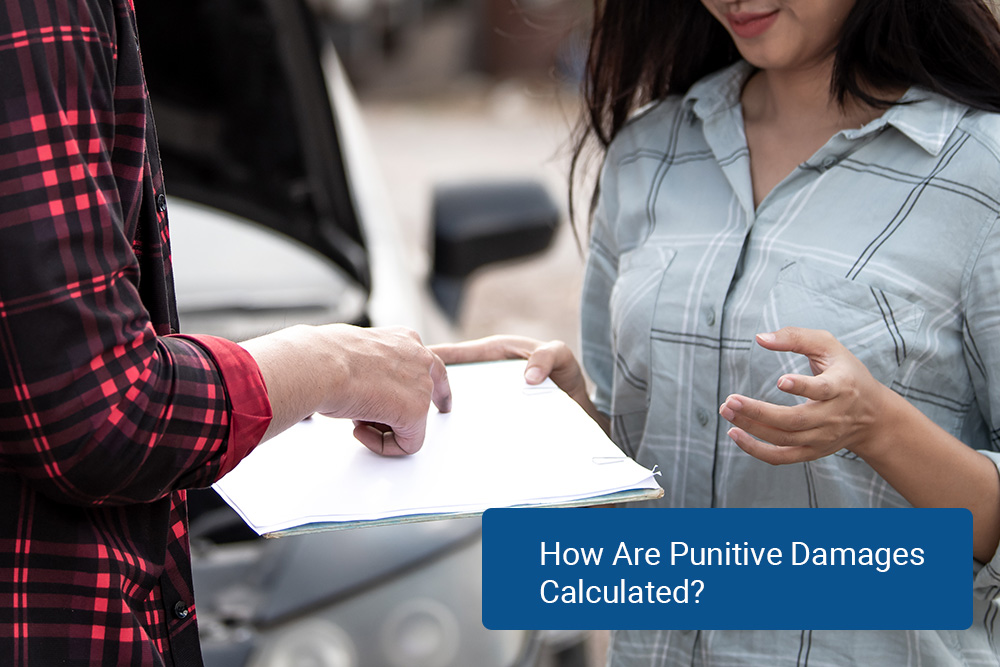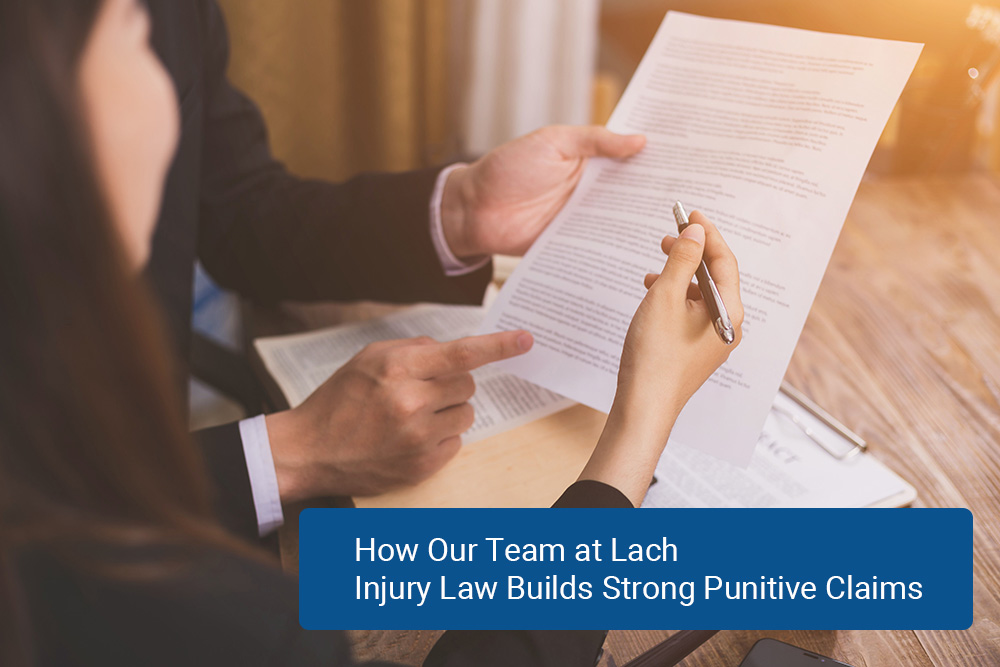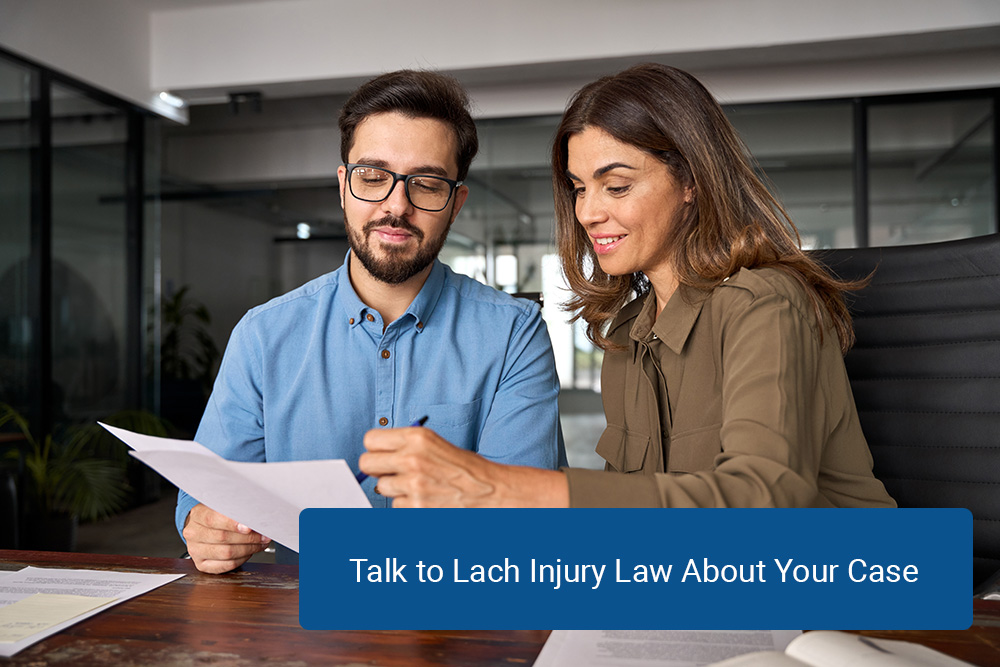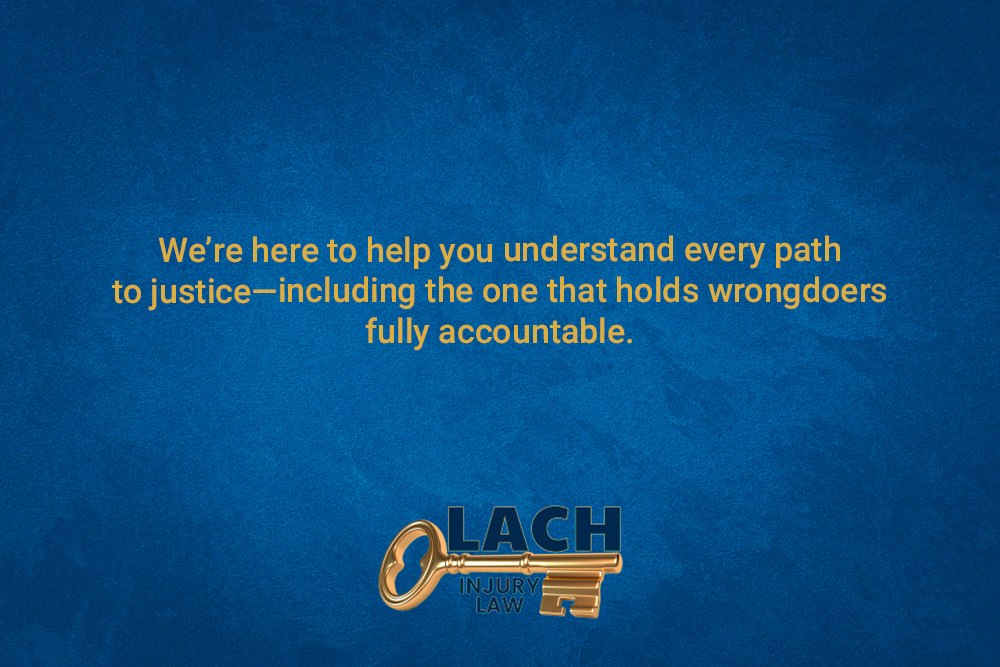
In a personal injury case, most people are familiar with the idea of compensation. That usually means getting money for medical bills, lost wages, or pain and suffering. These types of payments are called compensatory damages because they aim to help the injured person recover what was lost. But sometimes, courts go a step further and award something called punitive damages.
Punitive damages are not about making up for a loss. They are meant to punish the person or company that caused the harm. This type of award is used in serious cases where someone’s behavior was especially reckless or intentional. If you’re considering legal action after an injury, it’s important to understand how punitive damages work and when they may apply.
At Lach Injury Law, we help injury victims understand every aspect of their claim—including whether punitive damages are worth pursuing. Below, we explain what they are, how they are awarded, and what role they play in personal injury law.
The Purpose of Punitive Damages
Unlike compensatory damages, which are meant to help you recover, punitive damages are designed to punish the wrongdoer. The idea is to make sure the person or company who caused the harm learns from it—and to discourage others from doing the same thing in the future.
Punitive damages are most common in cases involving gross negligence or intentional harm. That could mean a drunk driver who caused a severe crash, a company that knowingly sold a dangerous product, or a landlord who ignored clear safety violations.
These cases go beyond simple accidents. They involve actions that show a clear disregard for other people’s safety. Punitive damages are the court’s way of saying that kind of behavior won’t be tolerated. At Lach Injury Law, we’ve seen this come up in cases involving defective products, dangerous premises, and extreme workplace negligence.
When Are Punitive Damages Awarded?
Punitive damages are not available in every case. In fact, they are only awarded in a small number of personal injury lawsuits. To qualify, your legal team must show that the defendant’s actions were more than careless—they must prove intentional wrongdoing or extreme recklessness.
In Nevada, courts look at several key factors when deciding whether to award punitive damages. These include:
- How bad the conduct was
- Whether the wrongdoer knew their actions could cause harm
- Whether the behavior happened more than once
- If the defendant tried to hide what they did
The court also considers the financial position of the defendant. In other words, a large company that acted irresponsibly may face a higher punitive damage award than a private individual. Our firm keeps this in mind when handling claims against corporate defendants, especially in cases involving grocery store accidents or retail workplace injuries.
How Are Punitive Damages Calculated?

There is no set formula for punitive damages, but the court generally considers two main things: the level of misconduct and the amount of compensatory damages already awarded. In many cases, punitive damages are a multiple of the compensation amount.
Nevada law caps punitive damages at either three times the compensatory damages or $300,000—whichever is greater—unless the case involves specific exceptions like product liability or insurance bad faith.
For example, if a jury awards $100,000 in compensatory damages, the court may allow up to $300,000 in punitive damages. But if the compensatory damages are $2 million, the punitive limit may rise to $6 million. These limits are there to ensure fairness while still holding wrongdoers accountable.
Our team helps clients navigate these rules and understand what level of compensation is realistic. We explain how courts in Nevada typically handle punitive claims and how similar verdicts have turned out in local cases.
Examples of Cases That May Qualify
Punitive damages apply only to the most serious cases, but they come up in a variety of personal injury situations.
Drunk or Distracted Driving
If a person causes a car crash while under the influence or texting behind the wheel, and the result is a severe injury or fatality, the court may see that as grounds for punitive damages. These actions show a reckless disregard for others’ safety.
Defective Products
If a company knows a product is dangerous but sells it anyway—like a household item with a known fire risk or a car part that fails during normal use—they may be hit with punitive damages, especially if they ignored safety warnings.
Employer Misconduct
If an employer knowingly exposes workers to unsafe conditions or fails to act after repeated injury reports, that behavior could trigger punitive damages in a workers’ compensation or third-party liability case.
Each of these examples highlights why punitive damages matter. They are not just about money—they are about sending a message that certain behavior is unacceptable.
How Our Team at Lach Injury Law Builds Strong Punitive Claims

To succeed in a punitive damages claim, evidence is everything. Courts require a high level of proof to justify a punishment beyond normal compensation. That’s why we take time to gather every detail that can support our case.
We start by identifying patterns in the defendant’s behavior. Did they ignore safety warnings? Did they have past violations or lawsuits? Did they mislead customers or hide defects? This type of background makes a strong case for punitive action.
Next, we work with expert witnesses when needed. In some cases, specialists can testify about the risks involved or show that the defendant should have known their actions would cause harm. These opinions add weight to our claims and help juries understand the full picture.
Finally, we prepare to explain the case clearly and forcefully if it goes to trial. While many cases settle out of court, punitive damages are often part of trial outcomes. We always stay ready to go the distance for our clients when justice demands it.
Is Pursuing Punitive Damages Worth It?
Not every personal injury case needs to include punitive damages. But in the right case, they can make a real difference, not just in financial terms but also in preventing harm to others.
If you were hurt in a situation involving gross negligence or repeated misconduct, our legal team can help you decide whether punitive damages are appropriate. We’ll look at your case from all angles, compare it to past outcomes, and give you clear, honest advice.
Sometimes, pursuing punitive damages also changes how the case is handled. Defendants may be more willing to settle when they know the risk of a trial verdict includes not just repayment—but punishment.
Talk to Lach Injury Law About Your Case

Understanding your rights in a personal injury case starts with having the right legal team on your side. At Lach Injury Law, we’ve helped people across Las Vegas fight for full compensation—including punitive damages where appropriate.
Our team handles cases involving vehicle accidents, slip and fall injuries, workplace harm, and more. We also serve victims of wrongful death and brain injuries caused by reckless behavior.
Explore our practice areas, check our latest blog, or contact us to schedule a free consultation. We’re here to help you understand every path to justice—including the one that holds wrongdoers fully accountable.





